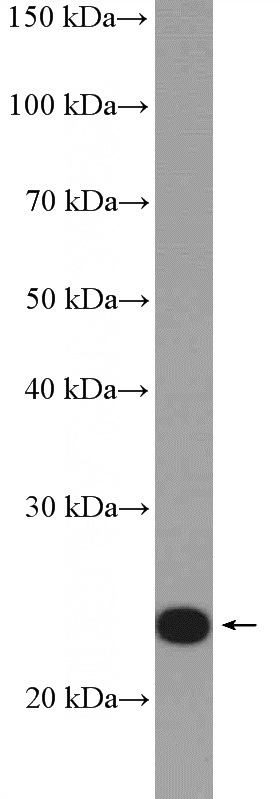-
Product Name
RALA antibody
- Documents
-
Description
RALA Rabbit Polyclonal antibody. Positive WB detected in mouse brain tissue, fetal human brain tissue, human brain tissue, MCF-7 cells, rat brain tissue. Observed molecular weight by Western-blot: 24 kDa
-
Tested applications
ELISA, WB
-
Species reactivity
Human,Mouse,Rat; other species not tested.
-
Alternative names
RAL antibody; RALA antibody; Ras related protein Ral A antibody
- Immunogen
-
Isotype
Rabbit IgG
-
Preparation
This antibody was obtained by immunization of RALA recombinant protein (Accession Number: XM_047420681). Purification method: Antigen affinity purified.
-
Clonality
Polyclonal
-
Formulation
PBS with 0.02% sodium azide and 50% glycerol pH 7.3.
-
Storage instructions
Store at -20℃. DO NOT ALIQUOT
-
Applications
Recommended Dilution:
WB: 1:500-1:5000
-
Validations

mouse brain tissue were subjected to SDS PAGE followed by western blot with Catalog No:114529(RALA Antibody) at dilution of 1:1000
-
Background
RALA belongs to the small GTPase superfamily. Multifunctional GTPase involved in a variety of cellular processes including gene expression, cell migration, cell proliferation, oncogenic transformation and membrane trafficking. RALA plays a role in the early stages of cytokinesis and is required to tether the exocyst to the cytokinetic furrow. The RALA-exocyst complex regulates integrin-dependent membrane raft exocytosis and growth signaling. As an effector of the proto-oncogene Ras, it play an important role in the molecular pathology of human malignancies.
-
References
- Jiang L, Cui Y, Luan J, Zhou X, Zhou X, Han J. A comparative proteomics study on matrix vesicles of osteoblast-like Saos-2 and U2-OS cells. Intractable & rare diseases research. 2(2):59-62. 2013.
Related Products / Services
Please note: All products are "FOR RESEARCH USE ONLY AND ARE NOT INTENDED FOR DIAGNOSTIC OR THERAPEUTIC USE"
